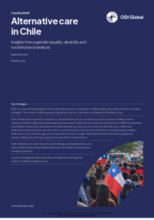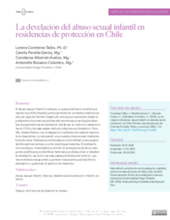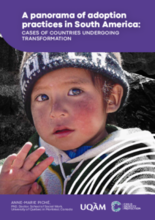Displaying 1 - 10 of 41
This article critically analyzes the complex journey undertaken by foster families who decide to adopt the children or adolescents they initially cared for on a temporary basis. Through the study of four cases, it examines the experiences and perspectives of Chilean families who chose to transform their role from foster care to adoption, presenting narratives that highlight the controversies, inconsistencies, and tensions between the logics of temporary and permanent care within the Chilean child protection system.
This brief analyses the state of alternative care for children in Chile, highlighting key statistics, sectoral findings and areas for policy improvement. It is part of a broader analysis of gender equality, disability and social inclusion (GEDSI) in Chile. The analysis draws on existing literature, government reports and key informant interviews (KIIs) with stakeholders working in this area.
El abuso sexual infantil constituye un grave problema mundial que resulta muy difícil develar, particularmente en contextos institucionales y sin soporte familiar. Desde allí, se busca comprender, desde la perspectiva de personas adultas sobrevivientes y psicólogas tratantes, las experiencias de develación del abuso en entornos residenciales en Chile y las respuestas institucionales tras su develación.
Four families torn apart by Chile’s illegal adoption scandal finally found each other decades later. They describe the emotional moment they met – and how they pieced together the lives they had spent apart
Fifty years after coup that delivered Pinochet power, thousands still grieve the children stolen during his rule.
Under the brutal 1973-1990 dictatorship, tens of thousands of babies were taken from their parents and adopted by foreigners.
This research brought together the testimonies of adoption professionals (national and international) concerned with the situation of abandoned and placed children in five South American countries: Argentina, Bolivia, Chile, Colombia and Peru. The aim of this study is to gain a better understanding of the new realities of adoption, in a context where these countries have chosen to limit or stop their foreign adoption practices.
This article from the Guardian tells the story of an adult adoptee, adopted from Chile to Sweden, whose search for her biological mother revealed that she had been "stolen" from birth. The article describes how many women in Chile in the 1970s and 80s, mostly from poor and minority backgrounds, had been tricked or coerced into giving up their babies for international adoption, as part of a national strategy to eradicate childhood poverty which began during the military dictatorship of Augusto Pinochet.
This article explores this workshop in terms of its relationship with the daily lives of participants, based on one year of fieldwork focused on families with young children in a low-income neighbourhood in Santiago.
The study from Chile, Lithuania and Norway explores how social workers define family and more specific the position of extended families within child welfare and thus indicate contextual differences and similarities.




